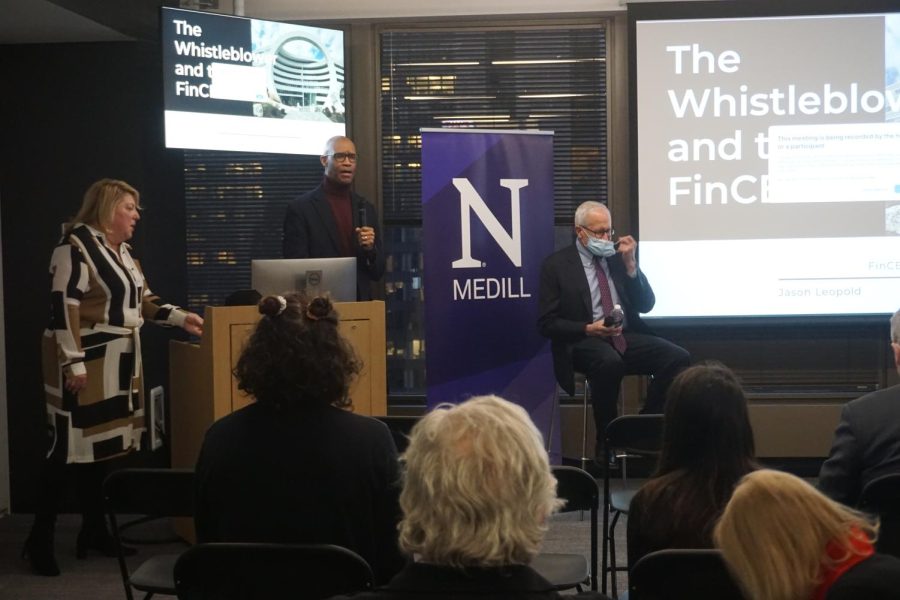Journalists break down investigation behind FinCEN Files story at Medill’s Chicago Campus
Ankita Mukhopadhyay/The Daily Northwestern
Medill Dean Charles Whitaker introduces the speakers at the Thursday FinCEN files event at the school’s Chicago Campus.
March 4, 2022
Professional journalists discussed how to produce a successful investigation on the Medill School of Journalism, Media, Integrated Marketing Communications’s Chicago Campus Thursday.
Pulitzer-winning journalist Michael Sallah, Pulitzer-nominated journalist Jason Leopold and David McCraw, deputy general counsel at The New York Times, spoke at the event. They discussed the “FinCEN Files,” a Pulitzer-nominated investigation that revealed the measures taken by big banks like HSBC and Standard Chartered to defy money laundering crackdowns, creating pressure on the U.S. law enforcement system.
The panel event was moderated by Debbie Cenziper, a Pulitzer-winning investigative reporter and the director of investigative reporting at Medill. She opened the panel by asking Sallah and Leopold how the whistleblower first contacted them. Leopold explained the journey to the documents wasn’t easy.
“You don’t get a knock at the door — that doesn’t happen,” said Leopold, a senior investigative reporter at BuzzFeed News. “You have to cultivate your sources.”
Leopold had known Natalie Mayflower Sours Edwards, who worked in FinCEN, an intelligence unit to fight money laundering in the Department of the Treasury, for more than five years.
May Edwards told him that she tried to address the more than 2,000 suspicious activity reports filed by banks and other financial institutions with FinCEN, Leopold said.
“I happen to be a document person,” Leopold said. “So I asked her to back up her claim with evidence.”
The documents cover more than $2 trillion in transactions. Leopold reached out to the International Consortium of Investigative Journalists, which created a team across 88 countries to investigate the potential money laundering.
Sallah, an investigations reporter at the Pittsburgh Post-Gazette who worked with Leopold earlier in his career, joined the investigation. It revealed the spread of “dirty dollars,” laundering money from other countries and converting it to U.S. dollars for profit, across countries like Colombia and Russia.
FinCEN had been alerting banks of money laundering and secret deals since 2004. The journalists said some of the information shocked them. Ihor Kolomoisky, a Ukrainian oligarch, bought more than 13 steel plants and commercial real estate in the U.S. with stolen money from Ukraine.
Leopold also attributed some of their success to luck. He reached out to an FBI agent about Paul Manafort, a former campaign manager of former President Donald Trump, who had been accused of money laundering. Surprisingly, he said, the agent had retired just two days before and could speak in detail about the investigation into Manafort.
The panel ended with a discussion about the human cost of the money laundering and the consequences for May Edwards, the original whistleblower.
“There were people working at the steel plant of Kolomoisky, and they died because of fires in the factories,” Sallah said. “We usually think that the rich people are doing their own thing and money laundering doesn’t affect others, but it has a human cost.”
May Edwards was fired from her job after exposing the FinCEN files and was arrested for “unlawfully disclosing” the files to Buzzfeed News. She spent about five months in prison, was released in January 2022 and will be on probation for three years. FinCEN also revamped its whistleblower program after the investigation.
Additionally, the government prepared a case against Leopold, but he wasn’t prosecuted.
“Journalists are more liable to be prosecuted if they seek out information from the whistleblower themselves,” McCraw said.
McCraw, who also teaches at Harvard Law School, said Jason wasn’t prosecuted because he didn’t personally seek out the information. He said journalists who willingly seek information from whistleblowers can be prosecuted for criminal intent.
Sallah said it is essential for journalists to make it clear to whistleblowers of the consequences of revealing information. The best way to gain sources’ trust is to assure them the publication will not reveal their identities, he said.
“May Edwards knew from the beginning that there would be consequences for her actions. It’s essential to maintain a clear channel of communication between the whistleblower and the journalist,” Sallah said.
Leopold ended the discussion by expressing his gratitude to Edwards for her bravery.
Although the investigation destroyed her life, he said Edwards was happy to see the change that came from it.
“She felt she was disappointing the American people by not being honest, and she values honesty in all walks of life. That is the quality of a whistleblower,” Leopold said.
Email: [email protected]
Twitter: @muk_ankita
Related Stories:
— Northwestern’s non-Medill media makers value experiential learning
— Medill and SESP welcome new academic advisors
— Medill celebrates its centennial with panel addressing major topics in journalism


